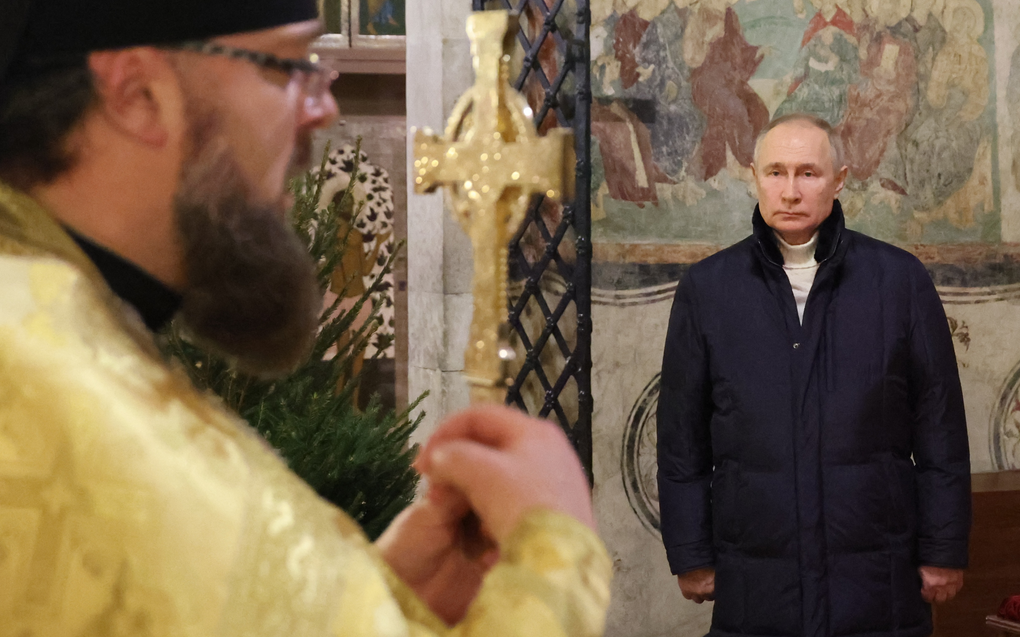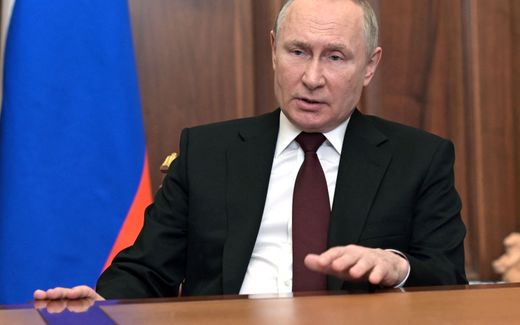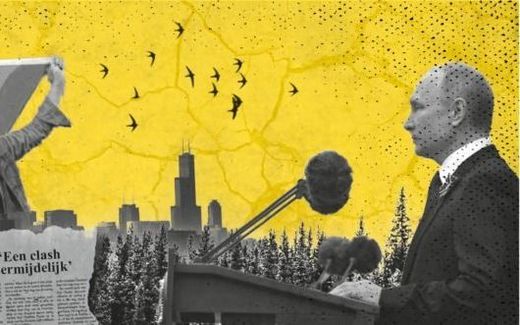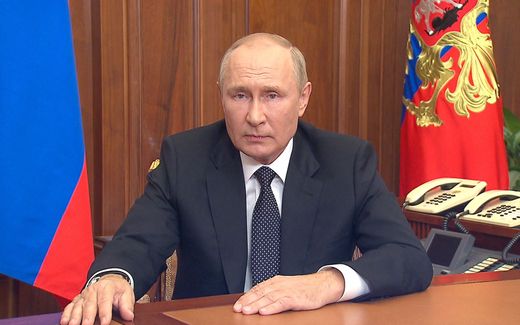Putin cherry picks from Bible texts in his speeches
07-02-2023
Eastern Europe
Johannes Visscher, RD

Photo AFP, Mikhail Klimentyev
Eastern Europe
In "shrewd" ways, Putin turns history to his will. He also "cynically" uses Bible texts to justify his invasion of Ukraine, discovered the Dutch researcher Niels Drost, who scrutinised the speeches of the Russian president.
It is crystal clear that Putin has repeatedly flirted with Christianity to appease the Russian Orthodox population in recent years. This is the conclusion reached by Drost, a researcher at the Hague-based Clingendael Institute for International Relations. He analysed some 11,000 speeches and interviews with Putin.
Role of history
Drost recently wrote, together with the Christian historian and terrorism expert prof dr Beatrice de Graaf from the Netherlands, an article in the Journal of Applied History, a scientific magazine about history. He focused on the role of history and Christianity in Putin's politics.
You write that Putin said in an interview that he always took the Bible with him on the plane. Would that really be the case?
Drost ("I am baptised, but not a believer"): "It's hard to say whether Putin is telling the truth here. There could be a grain of truth in that story. The fact is that Putin consistently presents himself as Christian, as devout and Russian Orthodox. To encourage his Russian troops in the Donbas, in eastern Ukraine, Putin quoted John 15 verse 3 ("No one has greater love than this, that someone laid down his life for his friends"). I find it very cynical to cherry-pick from the Bible like this to justify a war of destruction in your neighbouring country.

Typical of the "shrewd" Putin, he used all kinds of historical and Christian elements from his "bag of tricks" to get the Russian people on his side. Over the years, Putin's tone became increasingly grim. "For example, he uses elements from eschatology (end-time doctrine, JV). In 2012, Putin was asked when the world would end. Back then, Putin responded rather aloofly: "In about 4.5 billion years." About five years later, when it came to the end times again, Putin alluded to nuclear war.
In 2019, an interviewer asked Putin: "Are we any closer to paradise this year?" To which he said, referring to the problematic relationship with the United States: "Of course, the situation has not improved. Any aggressor should know that retaliation is inevitable and that it will be destroyed. And we as martyrs would go to paradise, while they just perish because they don't even have time to mourn their sins."
Putin accuses Ukraine and the West not only of Nazism but also of Satanism. What exactly is that about?
"Putin demonises his enemies and is becoming increasingly radical. He insists that the satanic West, which does not abide by biblical precepts, is sinking into destruction and decadence. Holy Russia, on the other hand, Putin claims, is fighting in the special operation not only against Ukraine but also against Western values, such as equal rights for LGBT people."
Does Putin's advocacy of Christian values raise sympathy among conservative Christians in, for example, the Netherlands?
"Yes. Putin's conscious strategy is to get conservatives in the West behind him. He stresses that a family, with a father and mother, is the pillar of society. This view is also found among many Christians in the Netherlands. But since the February 2022 invasion of Ukraine, sympathy in the Netherlands for Putin has fallen considerably, according to research by Clingendael. Within the (populist, ed.) Forum for Democracy party circles, Russia now has the most supporters."
Favourite leaders
Unmistakably, Putin constantly refers to history in speeches and interviews. He is not afraid to bend history to his will, Drost discovered. "Putin likes to refer back to Russia's imperial history of past centuries. For instance, he admires Tsar Peter the Great (1682-1725) and the Romanov family, which ruled Russia for centuries. One of Putin's favourite leaders is Prince Vladimir. He was the ruler of Kyivan Rus from 980 to 1015. Putin sees his conversion to Christianity and his empire as the cradle of Russian Christian civilisation today. And so Russia, Putin reasons, has every right to take back what he sees as historic Russian territories in Ukraine into Russia's fold. The term "take back" typifies Putin's use of language. However, his narrative of Russia in Prince Vladimir's time contradicts reality. Historians agree that around the year 980, there was no notion of a greater Russia to which Kyiv would belong. The empire was a loose alliance of regions."
Is it true that Putin is not likely to attack Islam?
"Yes. In Putin's view, Islam is a religion equivalent to Christianity. He stresses that Russia is a multi-faith state. Muslims in the Caucasus, for instance, are given every opportunity to practise their faith. It is also notable that Putin bridged the gap between the de facto atheistic communist Russia of the 20th century and Christianity and Islam, and Judaism on the other. For instance, Putin once said that communist ideology essentially adopted the moral and ethical principles of the Bible, Quran, Torah and Talmud. However, Christianity is, in fact, the state religion in Russia. There are close ties between the Kremlin and the Russian Orthodox Church."

You describe that the Ukrainian peninsula annexed by Russia, Crimea, has a sacred status for Putin. Why is that?
"For Putin and his supporters, Crimea belongs to the core of the Russian soul. He claims that Crimea has belonged to Russia since the 10th century. On that point, too, Putin falsifies history. In reality, Russia's Tsarina Catherine the Great captured Crimea in 1783. Crimea has belonged to all kinds of ethnic groups in recent centuries, such as the Greeks and the Tartars."
Is referring to history part of Putin's tactics, or is he really interested in history?
"Both things are true. Putin has a genuine interest in Russian history and devours history books. To students, he can talk for hours about tsars that lived centuries ago. But Putin also uses history as a weapon, albeit adapting it to his advantage. When he had just become president, Putin also referred to history in a friendly, positive way. He took a boat ride with George W. Bush, then America's president, in 2007. At the time, Putin pointed out that America and Russia stood side by side in the two world wars."
This article was translated by CNE.news and published by the Dutch daily Reformatorisch Dagblad on February 3, 2023
Related Articles





